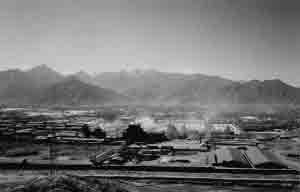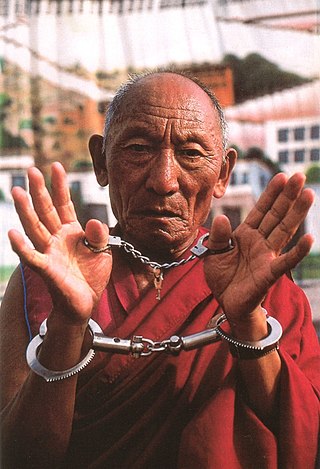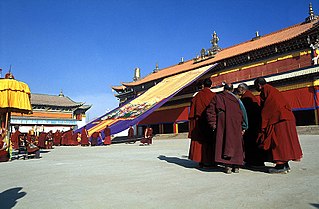Related Research Articles
Free Tibet (FT) is a non-profit, non-governmental organisation, founded in 1987 and based in London, England. According to their mission statement, Free Tibet advocates for "a free Tibet in which Tibetans are able to determine their own future and the human rights of all are respected."
Tibetan Freedom Concert is the name given to a series of socio-political music festivals held in North America, Europe and Asia from 1996 onwards to support the cause of Tibetan independence. The concerts were originally organized by the Beastie Boys and the Milarepa Fund. The idea for a Live Aid-style concert for Tibet was conceived by members of the group during the 1994 Lollapalooza Tour.

Takna Jigme Sangpo was the longest-serving political prisoner of Tibetan ethnicity, having spent 37 years in a prison near Lhasa.

Ani Pachen was a Tibetan freedom fighter and activist.

Drapchi Prison, or Lhasa Prison No. 1, is the largest prison in Tibet, China, located in Lhasa. Drapchi is named after its location and was originally a military garrison until it was converted into a prison after the 1959 Tibetan Uprising. It is roughly one mile from the city centre and is the main prison for judicially sentenced prisoners in Tibet. It was the primary place for the detention of political prisoners before 2005 when the newer and modernised Chushur Prison was built. Drapchi also goes by the name Delapuxie prison, which has sometimes been listed as a separate prison online.

Ngawang Sangdrol is a former political prisoner, imprisoned at the age of 13 by the Government of the People's Republic of China, for peacefully demonstrating against the Chinese occupation of Tibet in 1992. She was at first held for eight months without trial, before being sentenced to a three-year prison term. Her sentence was extended repeatedly for continued protest in prison, which included recording a tape of freedom songs with 13 other nuns from Drapchi Prison that was smuggled out of Tibet.

Namgyal Lhamo is an internationally acclaimed Tibetan Opera, classical singer and actor. She is based in Utrecht, The Netherlands.

Robina Courtin is a Buddhist nun in the Tibetan Buddhist Gelugpa tradition and lineage of Lama Thubten Yeshe and Lama Zopa Rinpoche. In 1996 she founded the Liberation Prison Project, which she ran until 2009.
Phuntsog Nyidron is a Tibetan Buddhist nun and a former high-profile prisoner in Tibet. In 1989, she and eight other nuns traveled from her hometown to the provincial capital of Lhasa when it was convulsed by Tibetan independence protests and riots, and handed out leaflets and shouted anti-Chinese slogans. She was tried and imprisoned for the charge of counterrevolutionary propaganda and incitement and imprisoned at the Drapchi Prison that same year. During her incarceration, she produced and smuggled out tapes of her and other prisoners' political songs, engaged in hunger strikes, and made publicized allegations of mistreatment. One of the better-known Tibetan prisoners outside Tibet, she was the subject of a release campaign by several United States Congress parliamentarians and governmental groups. Because of their efforts, and Chinese wishes to improve Sino-American relations, her sentence was reduced and commuted in 2004. She lives in Switzerland since 2006.

Palden Gyatso was a Tibetan Buddhist monk. Arrested for protesting during the Chinese invasion of Tibet, he spent 33 years in Chinese prisons and labor camps, where he was extensively tortured, and served the longest term of any Tibetan political prisoner. After his release in 1992 he fled to Dharamsala in North India, in exile. He was still a practicing monk and became a political activist, traveling the world publicizing the cause of Tibet up until his death in 2018. His autobiography Fire Under the Snow is also known as The Autobiography of a Tibetan Monk. He was the subject of the 2008 documentary film Fire Under the Snow.
Ganden Choeling Nunnery or Geden Chöling is a Tibetan Buddhist vihara for Buddhist nuns in Dharamshala, India. It is near the monastery in which the 14th Dalai Lama resides.
Wangdu is a former Tibetan monk who became an HIV/AIDS activist at the age of 41. He was sentenced to life imprisonment in 2008 for "endangering state security", and in 2012 he was in hospital.
Human rights in Tibet is a contentious issue. Even though the United States advocates the human rights of the Tibetan people and even though it once provided funds to the Dalai Lama's independence movement, the United States does not participate in the Tibetan sovereignty debate and as a result, it does not recognize Tibet's right to exist as a country. Reported abuses of human rights in Tibet include restricted freedom of religion, belief, and association; arbitrary arrest; maltreatment in custody, including torture; and forced abortion and sterilization. The status of religion, mainly as it relates to figures who are both religious and political, such as the exile of the 14th Dalai Lama, is a regular object of criticism. Additionally, freedom of the press in China is absent, with Tibet's media tightly controlled by the Chinese leadership, making it difficult to accurately determine the scope of human rights abuses.

Tenzin Bagdro is a Tibetan Buddhist monk and former political prisoner who currently resides at Tashi Choeling Monastery in McLeod Ganj, Dharamshala, Himachal Pradesh, India, home of the Dalai Lama and the Tibetan government-in-exile.

Kirti Gompa, is a Tibetan Buddhist monastery founded in 1472 and located in Ngawa, Sichuan province, in China, but traditionally part of Amdo region. Numerous other associated Kirti monasteries and nunneries are located nearby. As of March 2011, the Kirti Gompa was said to house 2,500 monks. Between 2008 and 2011, mass arrests and patriotic re-education programs by Chinese authorities have targeted the monks, reducing the population substantially to 600 monks. The wave of Tibetan self-immolations began at Kirti Gompa.

Protests and uprisings in Tibet against the government of the People's Republic of China have occurred since 1950, and include the 1959 uprising, the 2008 uprising, and the subsequent self-immolation protests.

Drapchi is a 2013 Tibetan-language Film directed by Arvind Iyer and stars acclaimed Tibetan singer Namgyal Lhamo in the lead role as Yiga Gyalnang. The film is a musical drama set against the backdrop of Tibet and Nepal and based on a true story. Drapchi has screened at the Manneim-Heidelberg, Cairo International, Warsaw International, Kerala International and Rome Independent Film Festival.

Jigme Gyatso is a Tibetan activist of the Tibetan Independence Organisation who, in 1996, was sentenced to 15 years in prison on charges of "leading a counter-revolutionary organisation" and "inciting splittism". Two more years were added to his sentence in 2004 when he protested in jail. Several international human rights groups have protested or campaigned on his behalf, and Amnesty International has designated him a prisoner of conscience.

Antireligious campaigns of the Chinese Communist Party are a series of policies and practices, including the promotion of state atheism, coupled with its persecution of people with spiritual or religious beliefs, in the People's Republic of China. Antireligious campaigns were launched in 1949, after the Chinese Communist Revolution, and they continue to be waged against Buddhists, Christians, Muslims, and members of other religious communities in the 21st century. State campaigns against religion have escalated since Xi Jinping became General Secretary of the Chinese Communist Party on November 15, 2012. For Christians, government decrees have mandated the widespread removal of crosses from churches, and in some cases, they have also mandated the destruction of houses of worship, such as the Catholic Three Rivers Church in the city of Wenzhou. In Tibet, similar decrees have mandated the destruction of Tibetan Buddhist monastic centers, the destruction of sacred Buddhist sites, the destruction of monastic residences, the denial of the Tibetan people's right to freely access their cultural heritage, the ongoing persecution of high Buddhist lamas, and the ongoing persecution of Buddhist nuns and monks. Reports which document the existence of forced re-education camps, arrests, beatings, rape, and the destruction of religious sites in Tibet are also being published with regard to the Uyghur people, who are being subjected to an ongoing genocide.

Lobsang Tashi, also known as Khenchen Lobsang Tashi (1897–1966) was a Tibetan politician who was a senior monastic official and the monastic prime minister (sileun) of the Tibetan government during the early Chinese occupation of Tibet. After the departure of the 14th Dalai Lama in 1959, he was incarcerated in Drapchi Prison where he died in 1966.
References
- 1 2 "Testimony given by Passang Lhamo, Tibetan nun and former political Prisoner, to the US Congressional Human Rights Caucus". Government of Tibet in Exile. 6 May 2002. Archived from the original on 19 August 2007. Retrieved 23 September 2008.